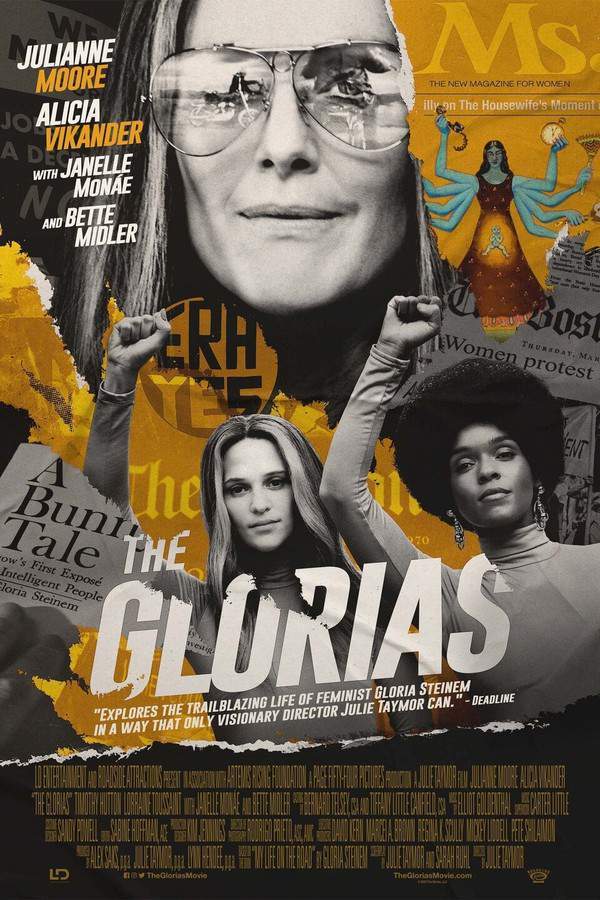
The Glorias 2020
Directed by

Julie Taymor
Made by

Amazon Studios
The Glorias Plot Summary
Read the complete plot summary and ending explained for The Glorias (2020). From turning points to emotional moments, uncover what really happened and why it matters.
A Greyhound bus travels along the highway, hosting a collection of Glorias, portraying the iconic Gloria Steinem at various stages of her life. This ensemble of women reflects on their past experiences, with the narrative beginning in Gloria’s childhood. Young Gloria, played by Ryan Kiera Armstrong, is captivated by her antique salesman father whose resourcefulness often frustrates her mother. However, a shift occurs when her parents separate and young Gloria assumes the role of caregiver for her mother, who succumbs to depression. As she cleans and rummages through her mother’s items, Gloria discovers several articles penned under a male pseudonym, which her mother had authored before her marriage, sparking a deep curiosity about her mother’s past.
As she transitions into a young adult, Gloria embarks on a fellowship to India. Upon her return to America, she faces the challenges of breaking into journalism amidst prevalent sexism and harassment. Despite these hurdles, she finds success writing about fashion and dating. However, when she exposes the harsh working conditions faced by waitresses at the Playboy Club, her prominence begins to rise, yet she feels conflicted about the nature of her accomplishments and declines an opportunity to expand her article into a book, grappling with her discomfort regarding how her work is often perceived.
Tragedy strikes when Gloria learns of her father’s death following a car accident. Guilt consumes her as she recalls having delayed visiting him, fearing she would have to take on the role of caretaker once again, similar to her past experiences with her mother.
While attending the March on Washington to profile James Baldwin, Gloria engages in a transformative conversation with a black woman, leading to an awakening regarding the intersecting prejudices faced by black women and recognizing her own role as a white woman within that dynamic. Further motivation arises when she participates in an event focused on illegal abortions, prompting her to deeply reflect on her own abortion that occurred shortly before her fellowship. The poignant stories shared by other women propel Gloria toward activism, fostering friendships with influential figures such as Dorothy Pitman Hughes and Florynce Kennedy, who mentor her in public speaking and advocacy.
In the early 1970s, Gloria along with her peers launches their magazine, Ms., providing a platform to discuss matters close to their hearts. The initiative garners attention when Gloria, along with 52 prominent women, boldly admits to having undergone illegal abortions in the magazine’s first issue.
Gloria’s activism escalates as she supports the campaign of Bella Abzug. She plays a vital role at the National Women’s Political Caucus, where various movements converge to push for the Equal Rights Amendment, which ultimately faces failure.
Throughout her life, Gloria persists in advocating for women’s rights and engages in political discourse, despite facing relentless scrutiny over her pro-choice stance and personal life choices, including her marital status and decision to remain child-free until marrying at 66, only to become widowed shortly thereafter.
In 2016, she writes a reflective article discussing the repercussions of Hillary Clinton’s loss in the presidential election of that year. As the narrative culminates, it is revealed that the Greyhound bus is filled with protestors heading to the 2017 Women’s March, featuring the real-life Gloria Steinem onboard. The film concludes with impactful footage from the march, showcasing the energy of the event and including a powerful speech delivered by Gloria herself, along with scenes from global demonstrations advocating for women’s rights.
The Glorias Timeline
Follow the complete movie timeline of The Glorias (2020) with every major event in chronological order. Great for understanding complex plots and story progression.
Gloria's Childhood
As a young child, Gloria is enchanted by her father's charm and his role as an antique salesman. Her father's 'make do' attitude often frustrates her mother, setting the stage for Gloria's early understanding of gender roles within her family.
Parental Separation
Gloria's parents separate, which forces young Gloria into the role of caretaker for her mother, who sinks into depression. This shift in responsibilities profoundly impacts Gloria's sense of identity and future aspirations.
Discovery of Mother's Past
While caring for her mother, Gloria uncovers articles written by her mother under a male byline, revealing her mother's lost identity as a writer. This discovery inspires Gloria to pursue her own ambitions in journalism.
Travel to India
Gloria receives a fellowship to travel to India, an experience that broadens her perspective on life and social injustices. Upon her return to America, she begins her journey as a journalist in a field dominated by men.
Early Journalism Career
In a male-dominated journalism landscape, Gloria begins writing articles on fashion and dating despite facing sexism and harassment. Her determination and talent allow her to gain recognition within the industry.
Exposé on the Playboy Club
Gloria writes an exposé that highlights the poor working conditions at the Playboy Club, which brings her significant acclaim. However, she grapples with shame, feeling that her work is often reduced to trivial subjects.
Father's Accident and Death
After her father's injury in a car accident, Gloria feels a knot of guilt for delaying her visit. Tragically, by the time she arrives a week later, she learns he has passed away, leading to deep introspection about family responsibilities.
Confrontation with Racial Issues
While attending the March on Washington, Gloria has enlightening discussions that challenge her views on race and the experiences of black women. This pivotal moment causes her to reflect on her own privilege and complicity.
Speak Out on Abortion
Gloria attends a speak out on illegal abortion, where the personal stories of women resonate deeply with her own experience. This ultimately propels her toward activism, seeking to amplify women’s voices and struggles.
The Launch of Ms. Magazine
In the early 1970s, Gloria and her peers launch Ms. Magazine to create a platform for women’s voices. The first issue boldly features 53 women who publicly acknowledge having had illegal abortions, sparking critical conversations.
Political Activism
Gloria actively campaigns for Bella Abzug and participates in the National Women’s Political Caucus, fighting for the Equal Rights Amendment. Despite their efforts, the amendment ultimately fails amidst societal pushback.
Continued Advocacy
Throughout her life, Gloria faces opposition to her pro-choice stance as well as personal inquiries into her marital status and childlessness. Nevertheless, she remains an unwavering advocate for women's rights and issues.
First Marriage and Widowhood
At the age of 66, Gloria finally marries, an event she had approached with caution. However, her joy is short-lived as she becomes widowed shortly after, adding to her complex journey of love and loss.
Article on Hillary Clinton's Loss
In 2016, Gloria writes an emotional article reflecting on the impact of Hillary Clinton’s loss in the presidential election. This piece encapsulates her continued engagement with the political landscape and women's rights.
The 2017 Women's March
As the Greyhound bus filled with protestors heads to the Women's March, it is revealed that the real Gloria Steinem is aboard. Footage from the march showcases her influential speech and unity among women worldwide advocating for change.
The Glorias Characters
Explore all characters from The Glorias (2020). Get detailed profiles with their roles, arcs, and key relationships explained.
Gloria Steinem
Gloria Steinem is depicted as a pioneering feminist activist and journalist whose journey reflects the struggles of her generation. She showcases resilience, navigating sexism in the media while advocating for women's rights. Throughout the film, Gloria embodies the spirit of activism and inspires others to raise their voices.
Dorothy Pitman Hughes
Dorothy Pitman Hughes is a key figure in Gloria's life, representing the intersectionality of race and gender in activism. She mentors Gloria, introducing her to public speaking and the importance of diverse voices in the feminist movement. Her friendship is instrumental in Gloria's development as an activist.
Leo Steinem
Leo Steinem, Gloria's father, is portrayed as a complex character whose influence shapes Gloria's early perceptions of masculinity and family dynamics. His 'make do' attitude symbolizes both resilience and the challenges inherent in family life. His injury ultimately leads to Gloria's deep sense of loss and guilt.
The Glorias Settings
Learn where and when The Glorias (2020) takes place. Explore the film’s settings, era, and how they shape the narrative.
Time period
1960s-2010s
The events of the movie cover a broad range of decades, starting from the 1960s and extending into the 2010s. This timeframe encapsulates significant social and political changes for women in America, reflecting the rise of the feminist movement. It shows the evolution of Gloria Steinem's activism against societal norms from her youth into her older years.
Location
America, India
The movie spans various locations, primarily focusing on America during the feminist movement of the 1970s. Significant moments take place across urban centers where activism thrives, including protests and rallies. There is also a pivotal moment in India, emphasizing Gloria's journey of self-discovery and awareness.
The Glorias Themes
Discover the main themes in The Glorias (2020). Analyze the deeper meanings, emotional layers, and social commentary behind the film.
✊
Feminism
The primary theme of the movie revolves around feminism and women's rights. Gloria Steinem's journey highlights the struggles women faced and the systemic sexism pervasive in various facets of life. The film emphasizes activism, personal empowerment, and the collective effort needed to challenge patriarchy.
💔
Loss and Guilt
Loss and guilt play a significant role in Gloria's personal narrative. Despite her achievements, Gloria grapples with the guilt of not being present for her father's passing, which echoes throughout her life. This theme illustrates the emotional complexities intertwined with her activism and personal choices.
📝
Identity and Journalism
The film explores the theme of identity through Gloria's evolution as a journalist. Facing societal challenges, she balances her professional ambitions with her personal identity, revealing how her experiences shape her writing. This duality fuels her passion for activism, urging her to redefine the narratives surrounding women.
Movies with Similar Twists and Themes
Uncover films that echo the narrative beats, emotional arcs, or dramatic twists of the one you're exploring. These recommendations are handpicked based on story depth, thematic resonance, and spoiler-worthy moments — perfect for fans who crave more of the same intrigue.
Featured on this page

What's After the Movie?
Not sure whether to stay after the credits? Find out!
Explore Our Movie Platform
New Movie Releases (2025)
Famous Movie Actors
Top Film Production Studios
Movie Plot Summaries & Endings
Major Movie Awards & Winners
Best Concert Films & Music Documentaries
© 2025 What's After the Movie. All rights reserved.





